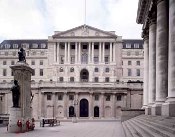The Bank of England’s Financial Policy Committee (FPC) has said that The Pensions Regulator (TPR) should take action “as soon as possible” to mitigate financial stability risks by specifying the minimum levels of resilience for liability-driven investment (LDI) funds and LDI mandates in which pension trustees may invest in the UK.
As reported by our sister publication Pensions Age, the FPC recommended that the size of the yield shock to which LDI funds should be resilient should be, at a minimum, around 250 basis points.
In reaching this judgement, the FPC explained that the "severe but plausible stresses" to which LDI funds should be resilient should account for historic volatility in gilt yields, and the potential for forced sales to amplify market stress.
The committee also clarified that while this minimum level of resilience should be maintained in normal times, it could be drawn down on in stress, and should ensure that funds could absorb a severe but plausible historical stress and still have a remaining level of headroom necessary to operate during a period of recapitalisation.
In addition to this, it noted that the proposed resilience levels for LDI funds are consistent with the regulatory approaches in place for other systemically important financial institutions, where standards are designed to allow institutions to continue operating after withstanding a severe stress.
"This level of resilience should allow LDI funds to remain resilient to severe but plausible systemic shocks without triggering forced deleveraging and feedback loops which threaten financial stability," the FPC stated, "while continuing to operate and meet margin and collateral calls and remaining resilient to idiosyncratic risks throughout."
The committee also noted that, to be able to maintain the minimum level of resilience in normal times, manage day-to-day volatility in yields and account for other risks they might face, including operational risks, funds would need to maintain additional resilience over and above the minimum.
While these are expected to vary between funds, the FPC noted that this approach would imply that total resilience levels should be broadly consistent with those currently prevailing in the market.
Although the FPC said that it welcomed TPR's previous guidance, as well as statements by the Financial Conduct Authority (FCA) and overseas regulators on the resilience of LDI funds, it argued that these were temporary measures, warning that the level of resilience might erode over time in the absence of a clear long-term approach.
Until an appropriate framework incorporating these elements is put into place, the FPC recommended that TPR, in co-ordination with the Financial Conduct Authority (FCA) and other overseas regulators, continue to ensure that LDI funds maintain the resilience that has been built up as set out in the FPC’s November 2022 recommendation.
The FPC also asked TPR to report back on how it intended to implement the recommendation.
More broadly, the FPC found that pension schemes might need to improve their operational processes to provide collateral to their LDI funds more swiftly when needed.
Commenting in response to the recommendations, TPR chief executive, Charles Counsell, confirmed that the regulator will be looking to issue updated guidance on LDI in April, taking into consideration the FPC's recommendations.
He continued: “We note the recommendations from the Bank of England’s FPC on LDI.
"The committee has clearly set out its expectations relating to the minimum level of resilience it wants trustees and fund managers to adhere to when using LDI, and I am pleased this builds on the guidance that we, and the National Competent Authorities (NCAs), put in place in November.
“In the meantime, I urge schemes to continue to follow our existing guidance, which is designed to ensure trustees achieve and maintain an appropriate level of resilience in leveraged LDI funds across pooled and segregated arrangements to withstand a fast and significant rise in bond yields, and improve operational governance of pension schemes.”
Latest News
-
Winners announced for inaugural Nederlandse Pensioen Awards
-
Sweden’s AP4 yields 6.3% return for 2025
-
Sweden's AMF delivers 6.2 per cent return in 2025 amid market uncertainty
-
News in brief: 20 February
-
Black Arrow Group pension scheme completes £7m buy-in with PIC
-
Dutch pension funds report improved January funding positions
Podcast: Stepping up to the challenge

In the latest European Pensions podcast, Natalie Tuck talks to PensionsEurope chair, Jerry Moriarty, about his new role and the European pension policy agenda
Podcast: The benefits of private equity in pension fund portfolios

The outbreak of the Covid-19 pandemic, in which stock markets have seen increased volatility, combined with global low interest rates has led to alternative asset classes rising in popularity. Private equity is one of the top runners in this category, and for good reason.
In this podcast, Munich Private Equity Partners Managing Director, Christopher Bär, chats to European Pensions Editor, Natalie Tuck, about the benefits private equity investments can bring to pension fund portfolios and the best approach to take.
In this podcast, Munich Private Equity Partners Managing Director, Christopher Bär, chats to European Pensions Editor, Natalie Tuck, about the benefits private equity investments can bring to pension fund portfolios and the best approach to take.
Mitigating risk
BNP Paribas Asset Management’s head of pension solutions, Julien Halfon, discusses equity hedging with Laura Blows
© 2019 Perspective Publishing Privacy & Cookies







Recent Stories